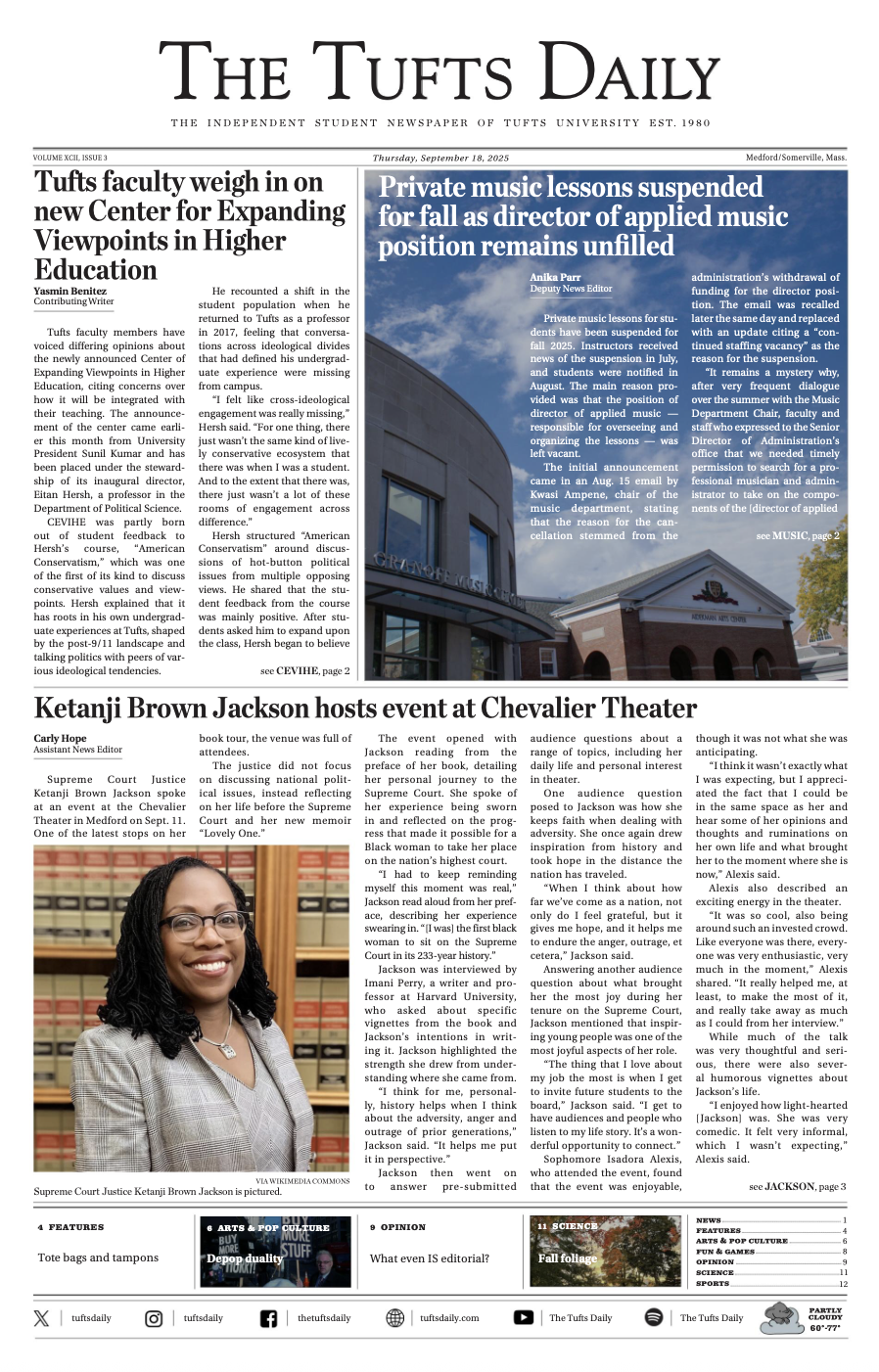A communication problem between professors and the bookstore often leads to low book resale values for students, according to professors and Tufts Community Union (TCU) senators.
In fall 2003, Tufts students received a total of $7,200 in buyback -- a decrease from $8,400 the year before. This amounted to approximately $14.73 per person.
In contrast, 2004 Tufts tuition statements estimated that undergraduates pay an average of $600 for textbooks.
TCU Senators John Valentine, Kyra Jackivicz, and Jason Bauer have been working since fall 2003 to make professors' booklists available to the bookstore and the student body before the beginning of each semester.
Senators last year focused on getting professors' book lists to students, so that students could find cheaper options for their books than the campus bookstore.
But after contacting department chairs, meeting with individual professors, and sending out mass e-mails, the group received less than 10 percent of the total booklists.
This semester, however, the senators have decided to change their focus to improving buyback rates for used books at the bookstore, allowing for more used books for students the following semester.
"What we really wanted to focus on this semester was increasing the amount of booklists that get to the bookstore," said Valentine, who addressed President Bacow and other university faculty about the issue March 3.
In the buyback system, a student can sell his or her book back to the bookstore and receive 50 percent of the original price if the store knows the book will be useful in a following semester.
The system relies on communication between the faculty and the bookstore. Last semester, by the final deadline to submit booklists, Dec. 1, only 42 percent were in.
When lists are not submitted by the deadline, the bookstore cannot repurchase used books. That limits the number of cheaper, used books that can be sold by the bookstore in the subsequent semester.
"Professors have busy schedules just like everyone else. We're basically just educating them to how much they can save for students' pockets," Valentine said.
If the bookstore is unaware of whether a professor plans to reuse a book in future semesters, the book will be repurchased at a much lower price -- sometimes as low as $1.
Ideally, Valentine hopes for a 20 to 30 percent increase in on-time book orders next semester. So far, the bookstore has already seen improvements in faculty response.
"Right now we're doing a little better than last year," Bookstore Textbook Manager Idalia Quintanilla said. "Finally, we have eight percent of the book orders [for the 2004 fall semester]. Last year, we didn't have any."
James Glaser, Dean of Undergraduate Education and formerly an associate professor and department chair of political science, said at the March 3 faculty meeting that the booklist deadline is not always a simple task. "It's true that some faculty are not as diligent as they should be," he said. "Part of it is that it requires you to be thinking six months ahead of time. Many people aren't thinking that far ahead."
Additionally, changing course readings can often be a difficult task for professors. "Is the book appropriate? Is it accessible? Is it in line with the themes of the course? Those aren't the sort of decisions that are made on the snap," Glaser said.
Ronna Johnson, a professor in the English Department who teaches a course that requires 12 books, said that determining what books she will use a year in advance is difficult. "The first week of class, we already have to commit to what we're teaching the following semester. Many of us know a year in advance. But just because I'm teaching English 63 next semester doesn't mean I'm using the same material."
In general, Glaser says, professors are well aware of the financial strain put upon their students. "Faculty have very good will on this," Glaser said. "They want to help students use their limited resources wisely."
The Education Committee will concentrate again on making the booklists available earlier for students once the bookstore's buyback prices reach a satisfactory level. In the meantime, they encourage students to e-mail their professors about the books for next semester.
"We want to put money back in students' pockets," Valentine said. "It helps the bookstore make more money, because they'll be selling used books. Additionally, there will be more used books next year for students to buy. So it all works out to make the system a lot more efficient than it is now."
More from The Tufts Daily





